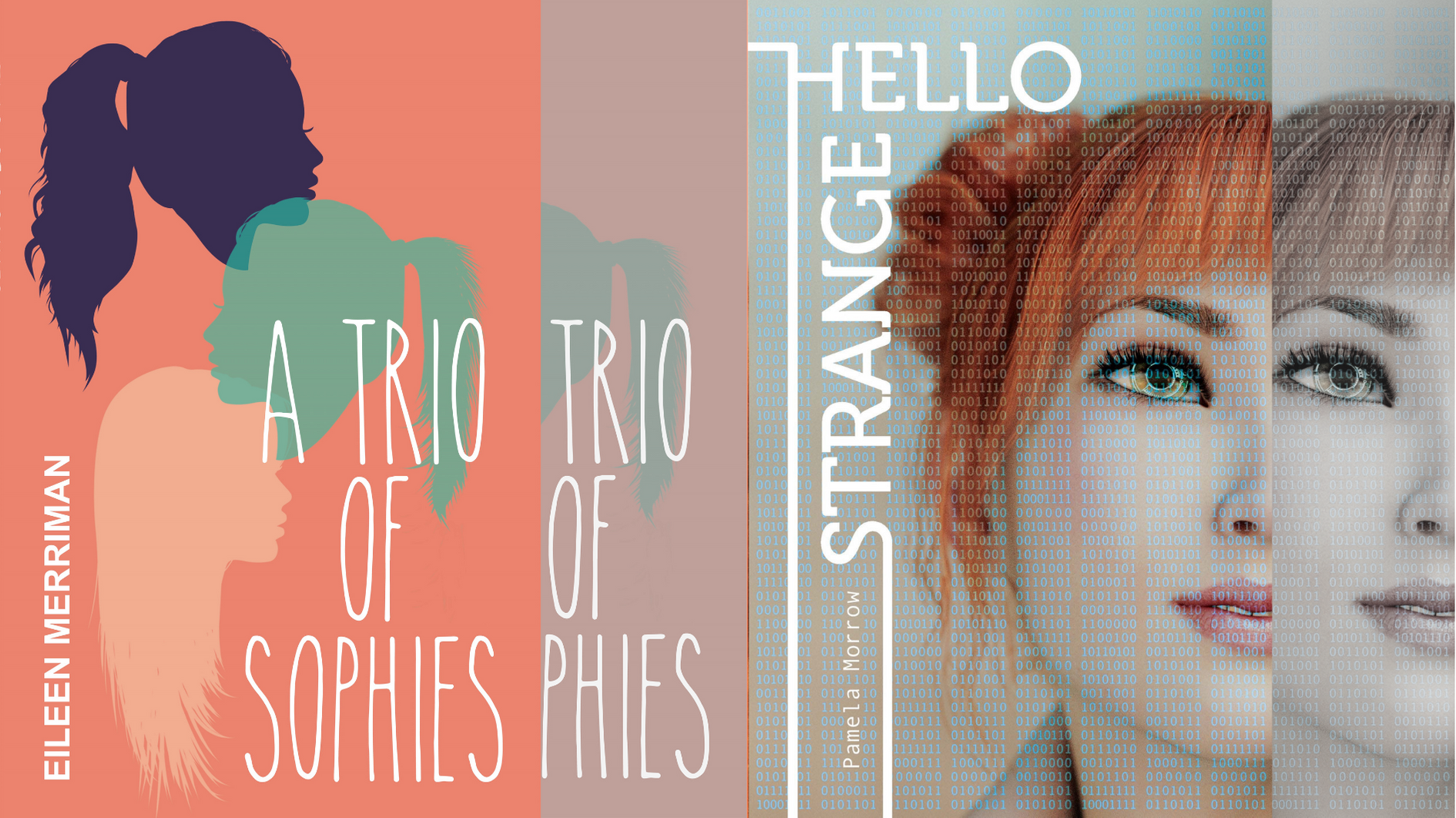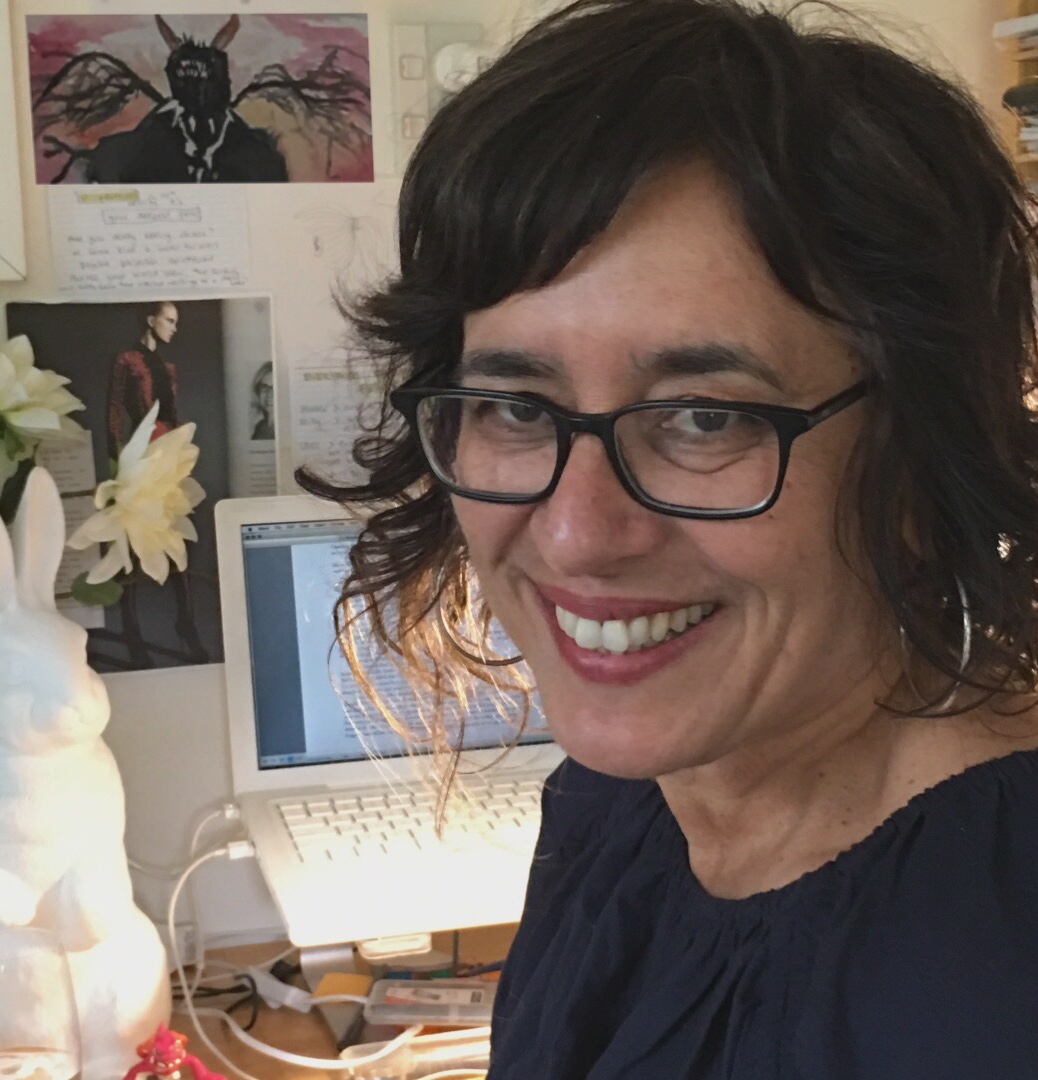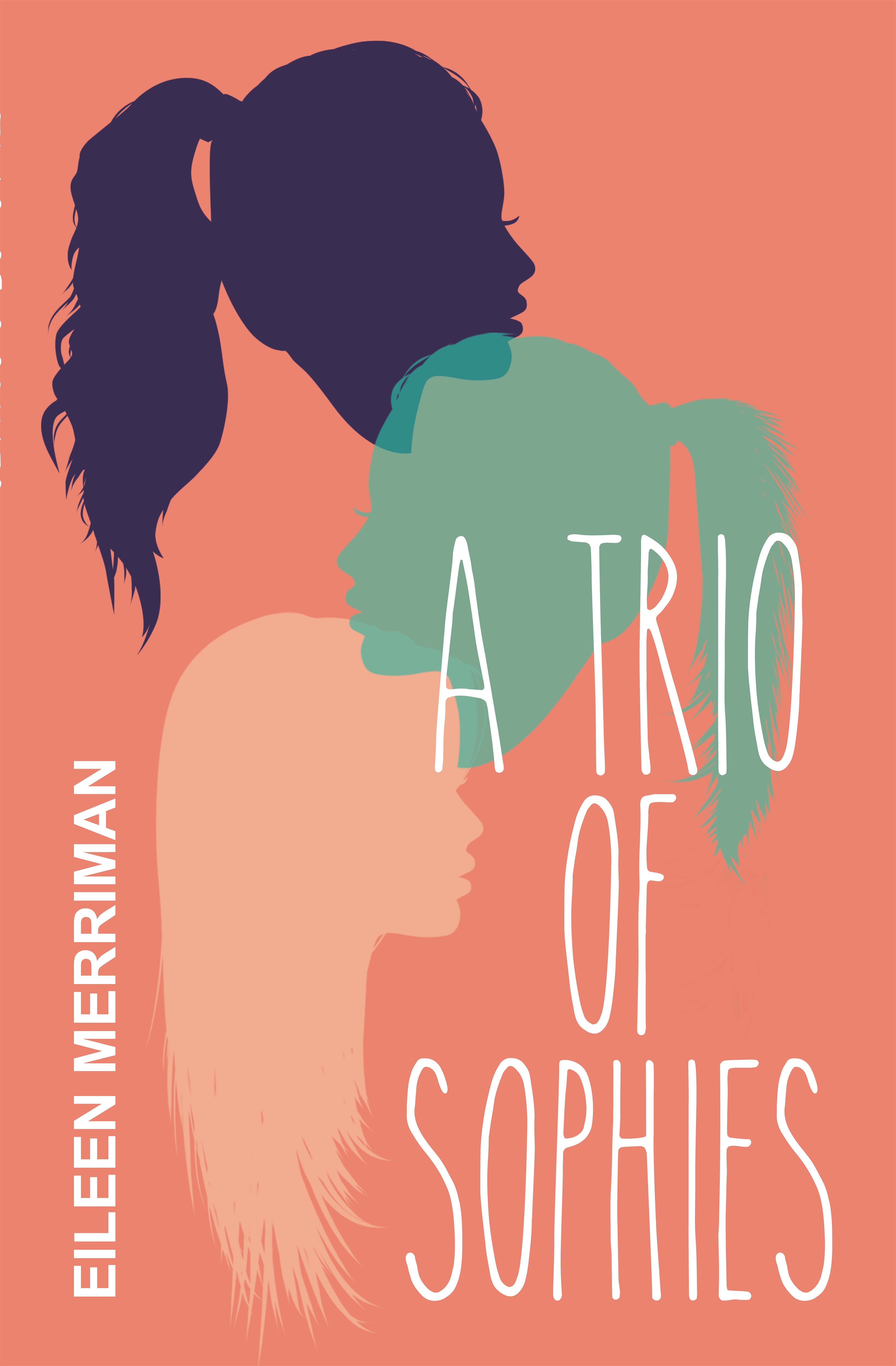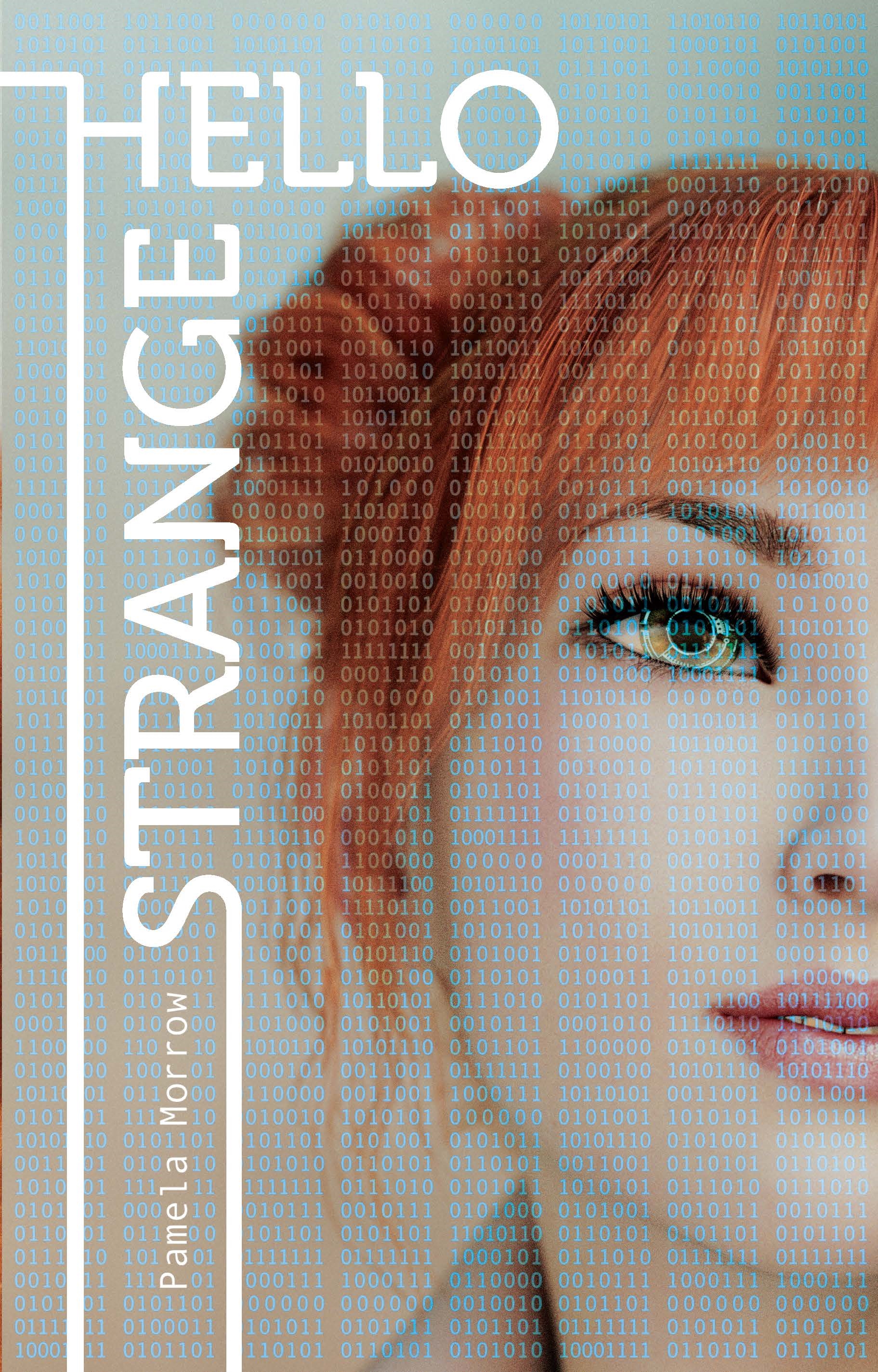Eileen Merriman has published three books for young adults, and one for adults in the past three years, including her March release A Trio of Sophies. Pamela Morrow has just published her first book for young adults, called Hello Strange. The books are completely different in content, but what they share is a respect for the emotions of teenagers. We asked them to discuss that aspect of each of their work for The Sapling.

Eileen: Congratulations on the publication of your debut novel, Hello Strange. You have created a really interesting cast of characters, many of them teenagers. The most interesting of these characters is Josie, a humanoid who has the unique ability to adapt, especially in the area of emotional intelligence.
What made you conceive of this character? How did your experience as a visual effects artist play into this?
Pamela: Working as a Visual Effects Artists means I’m often creating laser beams and explosions. The challenge in such a domestic story is to find opportunities for the odd bout of laser fire and a way to blow stuff up. But of course! Miles (Josie’s creator) has surplus, military grade robots lying about the place and an assistant who is too fond of experimentation.
I’m also a big science nut and when I started writing quite a few years ago, I wanted romantic characters that embraced a scientific principle of some kind. Quantum entanglement was one of my first inspired ideas: two smitten characters who can affect each other from a distance. Or if something happens to one, it happens to the other as well. I would never have pulled it off. Then someone posted a clip of Actroid F, a creepily human-like robot, yet also quite sweet. I found her immensely disturbing, so I researched like mad to see how ‘true’ she was. The end result was Josie, who became a character who knows more about human emotions than her human companions, yet is in denial of her own very strong feelings. I couldn’t help giving her some of my personal frustration at living with messy young people.
In A Trio of Sophies, Mac also has a similar contradiction in her emotional makeup. Sophie M is hyper-aware of her inner emotional dimensions, yet misreads, or is in denial of those close to her. Was that something you started with consciously, or did you discover that about her as you unravelled her story?
E: I deliberately set out to have Mac as an unreliable narrator, which is not necessarily a conscious thing for her. A major theme in A Trio of Sophies is the unreliable nature of memory. Many would say our memories are constructs of events, and one sees this demonstrated when police try to obtain eye witness accounts of say, an accident — people often remember the same event very differently, even if they are not setting out to lie. Add in heightened emotions, guilt etc, and one’s memories can change to become something that perhaps one is better able to cope with. Mac herself says that memory is ‘fallible and malleable’. At the same time, she is very aware of her see-sawing emotions, which often threaten to overwhelm her. For instance, on day 61 in her diary (sixty-one days since her best friend, Sophie A went missing), Mac says, ‘when I woke this morning, the rain was pounding the roof, crescendo-decrescendo, like the beating of my heart. It made me wonder how many heartbeats I had left’. Later, she says, ‘I do have a heart. It’s still beating. I wish it would stop’.
Similarly, in Hello Strange, 17-year-old Hunter creates a mechanical heart (an intriguing concept!). At one stage in the book, after an emotionally charged encounter with Josie, we see Hunter contemplating his mechanical heart in the workshop: ‘you could call it finished, it’s working perfectly. So what? Fill it with blood, grow skin on it??’ only to have him think: ‘or he could throw it against the wall and smash it…give his anger satisfaction’. Josie also notes that Hunter, in trying to deal with his mother’s recent death, has ‘sorrow that needs words’.
…our memories are constructs of events, and one sees this demonstrated when police try to obtain eye witness accounts of say, an accident — people often remember the same event differently, even if they are not setting out to lie.
Do you think this common thread reflects a developmental stage in teenagers i.e. learning to give voice to their emotions, and to deal with their emotions? Or do you think this is true of adults as well?
P: Emotions are such powerful drivers. I think there is a need for us to grow comfortable with them, or to stick with a literacy metaphor, to be fluent in our emotional makeup at any age, especially with emotional responses that trouble us.
In A Trio of Sophies, there is no hiding from emotions for Mac of course. There is a beautiful and frightening image on day 60, the first of her dream diaries, where she’s prone on the seabed with ‘rocks on my palms and a conch shell in my mouth’, along with a stifled breath, which is a striking metaphor for the suppression of fearful emotions.
I’m all for self-knowledge, but it’s also fascinating and helpful to understand how our brains have evolved. For example, the role of our limbic system in the stimulation of a flight/fight response — one of the oldest parts of our brains in evolutionary terms. These days of course we are unlikely to encounter a starving predator at the local Countdown, yet our limbic brains keep firing away. OMG!! Did I remember to brush my hair?
I’m all for self-knowledge, but it’s also fascinating and helpful to understand how our brains have evolved.
I think it’s fair to say that both of our main characters get pretty limbic when the green-eyed monster, JEALOUSY, rears its ugly head. Their responses are primal, for Mac flight, I turned and ran. I ran and ran. For Hunter it’s a fight response — he wants to take his fist, clench it, then smash it into the middle of Coel’s face.
It’s easy for me to step back and write such sentences, but how was your experience of first person/diary narrative and being right in there with Sophie M?
E: I prefer the first-person point of view for my young adult novels — it enables me to dive straight into my protagonist’s head. The diary narrative was new for me, and really fun, as I could write each day in a short period of time. It helped keep up the pace, and enables readers to dip in and out of the book (shorter attention spans and all that). Mac is a complicated character, and it helped me to explore her motivations by writing in this way. People are never black and white, and I wanted to show that, while retaining an air of mystery until right at the end.
With regards to emotion, in Hello Strange, humanoid Josie notes that ‘hair-trigger emotions are not the fault of the teenagers. At that age, the brain is still under construction’. To what extent do you think this is true? In relation to that concept, in A Trio of Sophies, Mac meets and lies to a teacher (James Bacon) about her age, saying she is a university student. The relationship, however, doesn’t end once James finds out that Sophie is a student at the high school where he is about to start his first teaching post.
People are never black and white, and I wanted to show that, while retaining an air of mystery until right at the end.
To what extent do you think teenagers can be responsible for their actions? Are they perhaps more sophisticated than we give them credit for?
P: Josie is being a little overconfident, dare I say smug, when she makes her observation about teenage brain development. Around puberty there is an over-production of brain cells, which undergo pruning to shape ‘ourselves’, a process that completes at around the age of 25 years. To quote David Eagleman from his book, on page 17 of The Brain: The story of you: ‘…who we are as a teenager is not simply the result of a choice or an attitude; it is the product of intense and inevitable neural change.’ It’s a pretty terrific time to be learning stuff. It can be less fun navigating the world of social relationships, or conforming to the parental safety net.
It might seem a little preachy, but if as parents and educators we’ve done our job right, our young people should have a keen sense of our values. Some lessons are learned the hard way, but holding teenagers to account for their actions must be handled with wisdom and care. There are always exceptions. There are certain teen incidents, such as Roast Busters, that even today fill me with horror and I dearly wished those responsible had been held to account.
I think one of the interesting things in A Trio of Sophies is that although our suspicion of James Bacon is there from the start, we go on to learn a little of his past and come to see that he is enthralled with Mac. There is also the mention of his previous relationship with an emotionally distant older woman. I wondered how that relationship played into James’s behaviour? Even though he might be considered the adult in the relationship, he isn’t lacking in hair-trigger emotions either. James is keenly aware that his position of teacher is built on expectations of conduct (which isn’t unlike how Josie is positioned in the narrative).
It might seem a little preachy, but if as parents and educators we’ve done our job right, our young people should have a keen sense of our values.
Is it fair to say that both Josie and James enter their roles and relationships naïvely? I’m interested to know, how does James sit with you?
E: Yes, I think Josie and James did both enter their relationships in a naïve manner, and then found it difficult (or were unwilling to) extract themselves once they’d crossed that line.
James, like Mac, is a somewhat enigmatic character. He knows his relationship with Mac is wrong, but as you say, he is besotted with her. James is an immature twenty-four-year old, and closer in emotional age to Mac than he would like to think. Does this excuse his behaviour? No, but perhaps it helps to explain his behaviour. As you mention, he has had a previous covert relationship with an older woman (when he was seventeen, the same age as Mac), and encounters like this at a vulnerable and impressionable time in one’s life can flow onto into (and sometimes sabotage) future relationships. James is also new in town, and has just started his first teaching job, which is bound to be stressful. So, yes, he is feeling vulnerable and lonely, and when he falls in love with Mac, only to find that she is not who she says she is… well, he is not so keen to give up on her that easily.
Similarly, in chapter 29 of Hello Strange, you have Josie undergoing a ‘morality crisis’ (in fact, that is the title of this chapter), but for a very different reason. Josie has just lied to a human and knows this is wrong, but at the same time has just realised that humans sometimes lie to avoid hurting each other’s feelings. So, she needs to find a way to reconcile this in her humanoid brain, which is something that humans do all the time. In doing this, Josie goes over and over the actions that have prompted the lie. I loved your attention to detail at this point, especially when you had Josie recalling Hunter’s facial expressions and reading his emotions.
How long did it take you to write this part? How did you research that? (I’m imaging you covertly observing friends and family!). And as a follow-on from that, you often mention hormones such as oxytocin, which Josie is very aware of and uses to her advantage — how much research did you do into hormones, pheromones and other human physiology when writing this novel?
P: Whaaaaat? I would never covertly observe friends and family! Or the friends of the teens in my family! Or complete strangers in a café, or restaurant! Goodness!!
Just kidding. Sometimes, very occasionally, when me and my lot are out and about we do, and not in a creepy way, enjoy people watching and speculating. Is that couple over there on a first date? Is that table grouping, with the cake covered in candles, celebrating a birthday?

Chapter 29 did grow out of the idea of being observed, though. In the previous chapter, the park scene is told from Bek’s (Miles’s assistant) point of view. I liked that Hunter and Josie were seen enjoying physical contact, but I felt I had missed an opportunity to show Hunter being a total romantic. Chapter 29 is a replay of that previous scene and when told from Josie’s POV, there is the added twist of Josie’s discomfort at her own romantic feelings. The fun part is bringing a lot of elements together.
Visual effects artists do a lot of scrubbing back and forth of the shots we are working on, so that attentive ‘replaying of a moment’ comes easily. I also researched facial expressions to get in the zone for what it takes to ‘read’ an emotion. This crops up for Josie on a number of occasions and I enjoy writing her blundering in regards to how uncomfortable it can get when in the grip of an emotional moment.
Visual effects artists do a lot of scrubbing back and forth of the shots we are working on, so that attentive ‘replaying of a moment’ comes easily.
I’m very interested in psychology and physiology. I remember being aware of oxytocin and its role in the mother-child bond when my own children were babies. Then, I came across a book called Love 2.0 which has a detailed account of experiments using oxytocin sprays and brain imaging. This inspired the scene later in Hello Strange. Josie’s intentions are well meaning when she uses biochemistry to affect animal behaviour, but things get out of hand when she accidentally exposes Hunter to her cocktail of hormones, pheromones and mineral salts. An overdose has an intoxicating effect on humans, thus enabling Josie and Hunter to loosen up a little.
At the end of a Trio of Sophies, I get the feeling there may be some unfinished business for Mac. Does this mean we will see more of her in a later title? What are you working on now?
E: No, I’m not planning on a sequel —I like to leave what happens next to the reader’s imagination. That being said, I am currently working on a YA dystopian/fantasy trilogy, having said I’d never write one! It is set in 2028 and has a medical/scientific angle. I’ve written the first two books and am awaiting my publisher’s comments before launching into the third book. [Eileen recently announced on twitter that these had been commissioned.]
How about you? Do you plan to write a sequel to Hello Strange or are you working on something else entirely?
P: I had plans from the outset for Hello Strange to seed a number of different projects. There is the main story, which tells of the Josephina line becoming something more than what designer Miles had in mind. I fancied the idea that subsequent books could explore futuristic scenarios, like a literary Black Mirror.
I have good intentions to develop The Saltines into a real animation and I also have a novel in mind for Prince Garrick and Maiden Raen, a sort of quasi-other-world Truman Show-like story. I also have an idea for a Hello Strange spin off project.
E: Great! I look forward to seeing your projects come to fruition. Thanks for chatting, Pamela!






